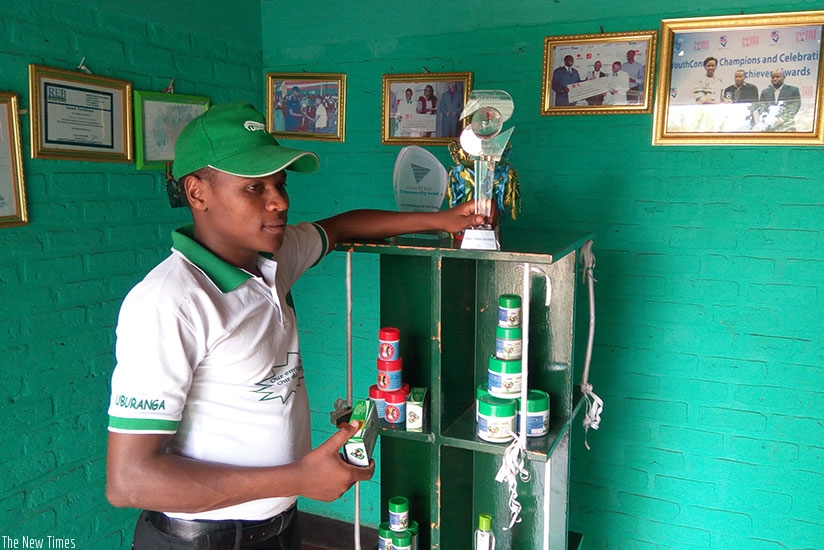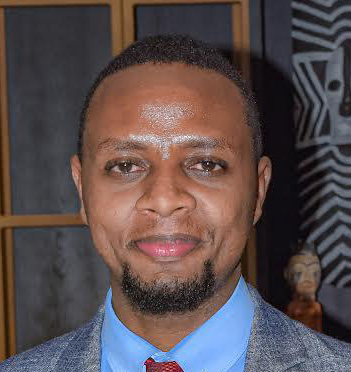The government encourages every Rwandan to use skills acquired in school to exploit and add value to the country’s natural resources to improve their income and standard of living and that of communities. This call has been answered by Musanze-based science teacher, Cephas Nshimyumuremyi, who makes cosmetics and soaps local plants, including aloe vera.


The government encourages every Rwandan to use skills acquired in school to exploit and add value to the country’s natural resources to improve their income and standard of living and that of communities. This call has been answered by Musanze-based science teacher, Cephas Nshimyumuremyi, who makes cosmetics and soaps local plants, including aloe vera.
Nshimyumuremyi’s innovation has also been recognised on the continent as the budding entrepreneur was one of the 20 Rwandans that participated in this year’s Tony Elumelu Foundation Entrepreneurship Programme. The programme trains and rewards 1,000 innovative entrepreneurs on the continent with up to $10,000 (about Rwf8.3 million) funding each. The Musanze-based Uburanga Products proprietor says the programme was a life-changing experience for him, noting he will use the exposure and skills gained to improve his project and transform community.
Inspiration
Uburanga Products currently produces anti-bacterial products, including herbal soaps and jellies. Nshimyumuremyi says the Rwf3 million business was borne out of need to apply the knowledge in a practical way.
"I wanted students to use the science they were learning in class and apply it in practical manner. So, we started experimenting with different plants to make natural cosmetics with healing properties to solve some of the problems the community was facing,” he notes.
With such practical and innovative approach to teaching science, Nshimyumuremyi hoped to motivate more students to pursue science courses.
"More importantly, I wanted them to think outside the box on how they can apply science to solve community problems,” says the 31–year–old entrepreneur, who is also a teacher at Groupe Scolaire Kabaya.
The Bachelor of Science (education) graduate says he had also conducted research while at university on the properties of some local medicinal plants.
"My research on Rwandan medicinal plants revealed that most of them had the potential to heal and prevent bacteria that can cause skin diseases. On realising this, I mobilised some money and started Uburanga Products,” he points out. Initially, the firm was making two products, which he says received a positive response from the market.
Commercial production
The businessman cum teacher says the launch of his two products, Uburanga Herbal Soap and Uburanga Herbal Jelly in 2014, provided the spark that ignited his entrepreneurship journey and in 2015, earned him the Young Rwanda Achiever and YouthConnekt Champion from the Imbuto Foundation and the Ministry of Youth and ICT.
As they say, reward for innovation is boundless; the young entrepreneur had earlier scooped Rwf6 million cash prize in the Educat-GT Bank Entrepreneurship Award in 2014.
This was a sharp contrast compared to Rwf2,000 initial investment into the venture. Nshimyumuremyi says the cash prize significantly boosted the start-up that is now worth Rwf3 million in total turnover, with 70 distributors across the country.
The businessman has a botanical garden, where he grows medicinal plants he uses in his products. This ensures constant supply of raw materials.
Challenges
"My initial capital was a big challenge, but now I sell Rwf3 million worth of products per month. Starting out, many people and wholesalers doubted the quality of the products and said the firm would collapse in a year or two since it was a small scale venture. Three years down the road and from three distributors we now have 70 distributors,” he notes.
Like all the start-ups, the greatest challenge Nshimyumuremyi had to grapple with was getting his business known by customers as advertising was expensive. This, coupled with the high cost of imported packaging materials, almost forced him to abandon ship. "However, I devised marketing strategies, like door-to-door sales, where we moved from town to town, advertising and selling directly to shop owners. We also took advantage of weekly markets across the Northern Province to create awareness about our products to win customers,” he explains.
He says contact-to-contact marketing strategy and community radios helped the firm to increase the visibility of its products. Nshimyumuremyi says competing against established brands from the region and elsewhere at times made it very hard to convince customers that used such products, considering that many Rwandans still prefer imported goods to locally-made ones.
Dealing with challenges
Though he was facing huge challenges, the entrepreneur soldiered on with limited resources, and always looked out for strategies to penetrate the market and grow his business to another level. Nshimyumuremyi says the Made-in-Rwanda campaign was timely to help Uburanga popularise its products and boost market share.
"However, all producers, the Private Sector Federation and the government must work hard to change the mind-set of Rwandans about local goods for us to gain more market share,” he notes.
Although he’s hopeful of using Made-in-Rwanda platform to increase customer base, he highlights challenges like standardisation, packaging, loan burden, taxes, they still face.
"The Rwanda Standards Board wants start-ups to have the same standards like a company that’s been operating for 30 years, making it hard to thrive as new businesses.
"We import packaging materials, which makes it costly for small enterprises,” he notes.
He adds that the tax body also levies high taxes on packaging materials, noting that many businesses have to service loans, making it hard to service them.
Using TEEP cash, skills to expand
Nshimyumuremyi plans to use the skills and money from the Tony Elumelu Foundation Entrepreneurship Programme to expand his business. Participants acquired skills in business and financial management, and problem analysis, among others, during the 12-week online training programme that he believes will come in handy for his expansion plans, including the launch of a new product, Uburanga Shampoo.
"I will use the money to launch my new product and the liquid soaps, which I intend to sell to hotels and institutions like schools,” he says.
Nshimyumuremyi also exports some of the products to Goma in the DR Congo, Kisoro in Uganda and northern Tanzania. He has two distributors in Goma and with this fund, he wants to set up a branch in Goma, an area with a high demand for his products.
"Through the programme, we were able network with other entrepreneurs from the continent...I want to use the contacts to enter new export markets in the near future,” he says.
With 70 distributors presently, Nshimyumuremyi targets setting up 300 distributorships on the continent, as well as reaching three million customers and earning Rwf30 million monthly in three years.
Advice
The businessman advises young entrepreneurs to use the knowledge they acquired from school to impact the community and improve their standard of living. He cautions against getting loans to start businesses, advising youth to embrace the savings culture to improve their financial health. "If you must acquire a loan, it should be to fund expansion plans of the businesses,” he says.


